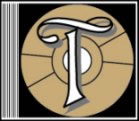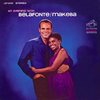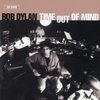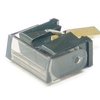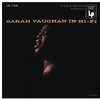AAA 100% Analogue This LP was Remastered using Pure Analogue Components Only from the Master Tapes through to the Cutting Head
EMI Testament - 33CX1094-95 - 180 Gram Virgin Vinyl - Mono
AAA 100% Analogue - Mastered at Abbey Road - Pressed in Germany
The Absolute Sound Super Disc List TAS Harry Pearson Super LP List
Testament has revived these classic titles from the EMI catalog using only the original EMI master tapes,cut onto lacquer at EMI's Abbey Road Studios and mastered using full analog techniques throughout production.
Testament deserves kudos for the flawless restoration of the clear mono sound, and for the immaculately quiet LP surfaces. This release is a significant sonic improvement over both my original Angel LP set and the EMI CDs. In reviewing older recordings of great merit, I have often suggested that such a performance is a worthy complement to a version with more modern sound. In this case, however, stereo be damned -- this is THE Tosca to have, especially if you are having only one. - Enjoythemusic Review
PUCCINI Tosca Maria Callas, Giuseppe Di Stefano, Tito Gobbi La Scala Chorus & Orchestra Victor de Sabata
This historic, mono version of Puccini's Tosca was recorded at the Teatro alla Scala in 1953, featuring soprano Maria Meneghini Callas and tenor Giuseppe Di Stefano. Conducted by Victor De Sabata and Chorus Master Vittore Veneziani.
Sardou wrote the play La Tosca for Sarah Bernhardt in 1887. Puccini was drawn to the subject even while still at work on La Boheme (1896). Tosca came out in 1900 in Rome when Puccini was 41.
This opera in three acts is about Floria Tosca and Mario Cavaradossi are in love and all they want is to be left alone. Baron Scarpia, however, wants Floria for his physical needs. He arrests Mario for aiding a fugitive and tells Tosca she can save him by giving herself to him. She agrees, but the kiss he has so longed for is the fatal kiss of a knife blade. He had promised to set up a false execution for Mario, but the treachery of Scarpia is revealed as Mario is killed. Tosca vows to meet Scarpia in front of God as she leaps over the side of the building to her death.
This historic, mono version of Puccini's Tosca was recorded at the Teatro alla Scala in 1953, featuring soprano Maria Meneghini Callas and tenor Giuseppe Di Stefano and The Orchestra and Chorus of La Scala Opera House, Milan conducted by Victor De Sabata.
This is one of the most justly revered operatic recordings ever made -- a dramatic and musical gold standard for Tosca despite its advancing age and monophonic sound. It was the last major recording project for Victor de Sabata, one of opera's greatest, yet least often recorded conductors. He brought a distinctive rhythmic urgency to this performance that you can hear from the very first bars, and he wove the vocal and orchestral textures together so organically that they still sound vivid today. He deserves a lot of the credit for making this one of the rare studio recordings that captures the energy and dramatic tension of a live performance. Maria Callas is at the top of her game, and still very much in her vocal prime. Her dramatic approach to Tosca is arguably even better captured in the live recordings from Covent Garden a decade later, but at that point her voice had lost some of its bloom; depending on your tastes, this may be the better example of her doing the role. Tito Gobbi owned the role of Scarpia, and considered it his finest characterization. Although he and Callas wouldn't perform the opera together on-stage for another 10 years, the chemistry and tension they brought to those later live performances are already in evidence here, as if they have done these roles together many times. The excitement of the second act is electric. And Giuseppe di Stefano still sounds youthful and fresh, not yet vocally worn from years of heavy singing. He makes the perfect partner for Callas, bringing an optimistic passion to the opening scene that sets off her more complicated persona. His final "E lucevan le stelle" is truly heartbreaking.
This half-century-old treasure remains the finest recording of Puccini's most dramatic opera, and rates a spot on my short list of best opera recordings of all time. What a cast! Callas' voice had not yet begun deteriorating into the painful wobble of her later years. The young Di Stefano, who was also to see his magnificent instrument deteriorate prematurely, was here in his vocal prime. Gobbi's distinctive, powerful deep rasp is one of the great baritone/villain voices ever. The smaller roles are filled superbly by a seasoned cast. De Sabata's inspired leadership of the La Scala forces illuminates every scene, unerringly supporting the score's tumultuous emotional ups and downs.
The great diva Maria Callas was born to play the diva Floria Tosca, and her interpretation of the role is dramatically incomparable. During her Act 2 confrontation with Gobbi's brilliantly malevolent Scarpia -- the heart of the opera -- Callas is completely convincing as she goes seamlessly from contempt to pleading to murderous satisfaction. And in the final scene, as Tosca first coaches Cavaradossi to act out his supposedly fake execution by firing squad, and then realizes that Scarpia has doublecrossed her and her lover is really dead, still raises chills after many hearings over the years.
Gobbi's Scarpia, by turns obsequious, brazen, lustful and shocked, is the perfect adversary. Cavaradossi doesn't have a lot to do dramatically -- he has showcase arias in Acts 1 and 3, and in Act 2he needs to scream convincingly offstage as Scarpia's men torture him. Di Stefano is perfect as the naive, idealistic, aristocratic artist, and his singing of the two arias bears comparison with anyone, past or present.
Testament deserves kudos for the flawless restoration of the clear mono sound, and for the immaculately quiet LP surfaces. This release is a significant sonic improvement over both my original Angel LP set and the EMI CDs. In reviewing older recordings of great merit, I have often suggested that such a performance is a worthy complement to a version with more modern sound. In this case, however, stereo be damned -- this is THE Tosca to have, especially if you are having only one. - Enjoythemusic Review
Puccini (1858-1924) - Tosca
Opera in three acts
Floria Tosca - Maria Meneghini Callas (soprano)
Mario Cavaradossi - Giuseppe di Stefano (tenor)
Scarpia - Tito Gobbi (baritone)
Cesare Angelotti - Franoc Calabrese (bass)
Spoletta - Angelo Mercuriali (tenor)
Shepherd-Boy - Alvaro Cordova (boy-soprano)
Sciarrone & A Gaoler - Dario Caselli (bass)
A Sacristan - Melchiorre Luise (bass)
Orchestra and Chorus of La Scala Opera House, Milan
Conducted by Victor de Sabata
Chorus Master: Vittore Veneziani
(Recorded in co-operation with the "E. A. Teatro alla Scala", Milan)
SIDE 1
Act 1 (Part 1)
SIDE 2
Band 1 - Act 1 (Conclusion)
Band 2 - Act 2 (Part 1)
SIDE 3
Act 2 (Conclusion)
SIDE 4
Act 3
Testament has revived these classic titles from the EMI catalog using only the original EMI master tapes, cut onto lacquer at EMI's Abbey Road Studios and mastered using full analog techniques throughout production.

